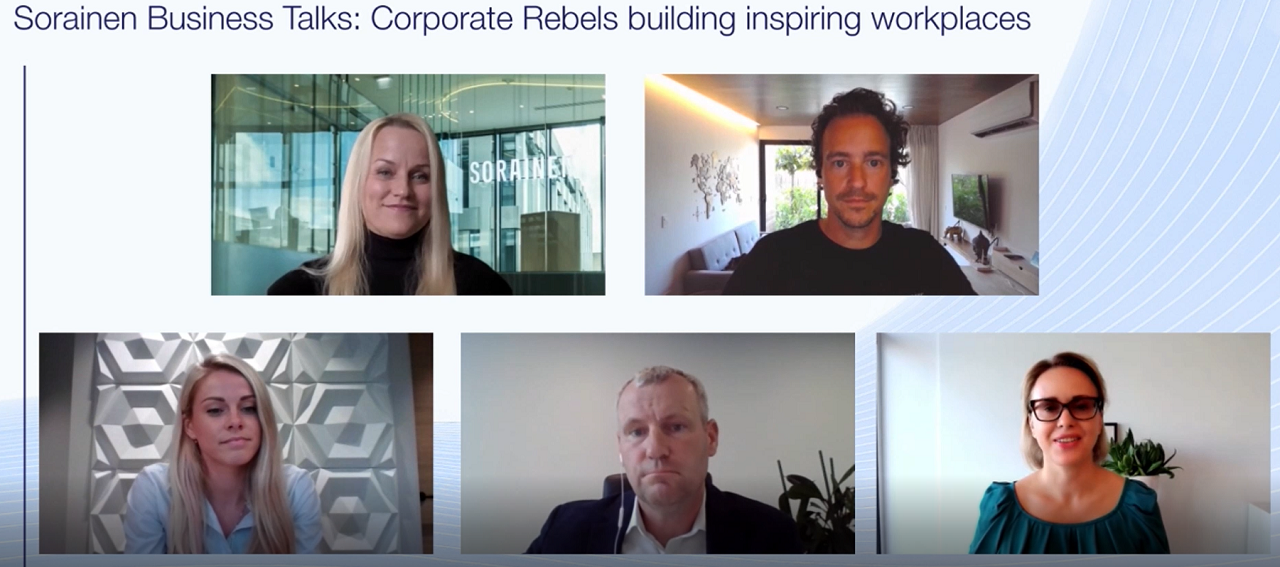To increase employee engagement, companies have to make some radical workplace changes and celebrate their rebel talent, Corporate Rebels co-founder Pim de Morree told at the annual Sorainen Business Talks event on 9 September.
Corporate Rebels is a movement started by two Dutch guys who quit their corporate jobs to travel the planet and visit the world’s most inspiring organisations. They have now seen over 150 progressive workplaces.
Pim de Morree shared the statistics reflecting the current high levels of disengagement among global workforce: only 15% of the world’s employees are engaged, while a whopping 18% are actively disengaged, actually sabotaging their workplaces. Surveys show workplaces also make people sick, with two thirds facing burn-out symptoms. To fight the doom, the rebels have uncovered eight trends that set inspiring organisations apart.
Post-COVID advice: look beyond counting office days
Pim de Morree encouraged to look beyond counting work days and hours in the post-COVID workplace management. “I urge you to look beyond just “days in the office” discussion, because otherwise you are doing exactly the same thing as before – tell people what they have to do. Instead – give people opportunity to decide for themselves,” he said.
He also emphasised the need to distribute decision making to avoid spending full days in Zoom calls. According to Corporate Rebels, the smart thing to do is provide freedom and expect results, matching freedom with responsibility. Making everyone able to influence their performance and results will be the best motivation.
To start the change in your organisation, he advised to begin by finding allies and setting up small radical experiments, thus building internal change movement.
Quick tips from inspiring Baltic workplaces
Sorainen invited three entrepreneurs-business leaders to share tips on increasing employee engagement.

Arminta Saladziene, Vice President of Post Trade at Nasdaq: Making a cultural transformation has three important attributes, which are being consistent, including people, and being persistent. We have recently added a new corporate value – driving innovation. Now we walk the talk by providing programmes, learning opportunities, hackathons. Innovation is very much about psychological safety and intelligent risk taking, so you have to educate leaders, and grant employees autonomy and the right to fail.
- Every other week, CEO now gives informal Townhalls where employees can ask any questions, and the most uncomfortable ones get to be addressed first. The pandemic turned out to be the great equaliser, since everyone is now a Zoom call away from the CEO.
- More democratic access to learning and development, which previously used to be geared towards management. Now people get to choose their learning goals.
- Talent marketplace – people can contribute outside their team.
- Decentralised recognition.
Priit Koit, CEO of energy company Utilitas: People need to believe that they contribute to something bigger. Utilitas is the largest renewable energy producer in Estonia, so our cause is tackling climate change. People don’t love pipes and turbines, but they do love saving the environment.
- Questions in employee surveys that measure friendliness of the company, but also monitor whether people believe in human-caused climate change and our possibilities to make a change.
- Returning to three key employee qualities: committed, professional, cooperative.
- Optimal mix of change and stability. Welcoming young people who bring change with them.
- Scholarships to students.
Egija Gailuma, former Country Manager at CityBee Latvia: People follow leaders who have good ideas, deliver results, are enthusiastic, and make other people feel better about themselves. Great leaders set a tone for the culture, determine the direction, do their magic; infect others with enthusiasm and play the long term. There are two kinds of rebels. Some just hate everyone and push some buttons. The good rebels are challenging in the good way, and are usually passionate about the company.
- As a leader, one should adopt the identity of a learner, so your self-esteem comes from being a learner, not being right.
- Don’t just say to rebels “I heard you”, but actually test their ideas, even if on a small scale. You can in fact hold two competing ideas in your head and let them take shape.
Sorainen has also identified some ways to increase employee happiness:
- Shared Mission programme launched at the onslaught of the pandemic to give free legal advice to innovative organisations, companies and initiatives that aim to do good in local and global communities
- Upside-down evaluation: annual engagement survey with results discussed by teams and improvements introduced by leaders, “bottom up” firm awards
- Regular all-firm Townhall calls for updates of financial situation and other status reports
- Initiatives to increase well-being: freedom to work remotely, one-time financial support for equipping home office, half-Fridays off in summer, mental health consultations


